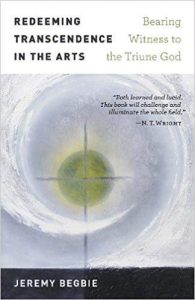Redeeming Transcendence in the Arts: Bearing Witness to the Triune God (Jeremy Begbie, 2018)

Art and transcendence
The West today is secularized, meaning that increasingly it is believed that human purpose and flourishing can be achieved without reference to the divine. Yet often in the arts, people—even robustly secular people—report an experience of transcendence, a sense that something lies “beyond” the here and now.
In Redeeming Transcendence in the Arts, Jeremy Begbie explores this very human and cultural phenomenon. He clarifies what people mean when they speak of transcendence in the arts and explores how this has been defined as an experience of sublimity—“to be overwhelmed, awestruck by something that exceeds our perceptual and cognitive grasp” [p. 43]. He then defines transcendence in biblical perspective and argues that the sense of transcendence in the arts is deepened when it is conceived not in the ambiguous terms of sublimity, but in reference to the biblical God, Father, Son and Holy Spirit.
In the end, what I have been arguing amounts to a plea and an invitation. The plea is that when we make claims about the arts affording an awareness of divine transcendence—or meet such claims made by others—we should be prepared to explore, and where appropriate, make explicit and assess, the theology those claims presuppose. Every judgment we make about divine transcendence, even the outright denial of it, presupposes beliefs about a deity (however inchoate) and the kind of relation that deity has (or does not have) with the finite world. I hope we have done enough to show that the belief that there is a kind of general, all-purpose transcendence, a metaphysical mold that can be unproblematically filled in with whatever particular brand of religious conviction we prefer, is profoundly misguided…
But along with a plea there has been an invitation: to enter far more deeply into the peculiarities of what we have been calling a “scriptural imagination,” and more deeply than many of us working at the theology and arts interface today have managed to travel so far. Sadly, we have often settled for what amounts to a bland metaphysics borrowed from the philosophical memory of a waning culture. [p. 184-185]
This is a serious work of aesthetics, one that rewards careful reading and reflection. Jeremy Begbie, a thoughtful scholar, trained musician and committed Christian is a gift to the church at a moment when thinking seriously about the arts and belief in God is on the cutting edge of Christian apologetics and philosophy.
Book recommended: Redeeming Transcendence in the Arts: Bearing Witness to the Triune God by Jeremy Begbie (Grand Rapids, MI: William B. Eerdmans; 2018) 186 pages + bibliography + index.

